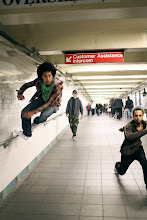In the American premiere of “Id:Entidades,” the choreographer and director Sonia Destri deconstructed hip-hop and street dance. At the start, nine dancers sat in the shadows along the back of the stage with their knees propped up and their arms loosely wrapped around their legs. Drifting toward the center in pairs, they offered tantalizing glimpses of oscillating bodies, showing the preparation of a movement or the in-between steps — not the stunt itself. They brushed their legs on the floor, but never spun on their heads. Jogging in circles led to no destination in particular, and popping shoulder isolations began with sinewy power yet dissolved like dust. They embodied a casual rigor, fortified by Rodrigo Marçal’s meditative score and Dominique Palabau’s shady, lighting, which evoked the underworld. In this dreamlike work Ms. Destri refused to give in to attitude and posturing, rendering a typically presentational form of dance nonpresentational
The New York Times, Gia Kourlas OCT 2, 2010
Lastly came “Companhia Urbana de Dança,” from Brazil, made up of beautiful, wild-haired young men from the rougher neighborhoods of Rio. They performed “ID: entidades,” a suite of deconstructed hip-hop, street-dance, and contemporary- dance miniatures set to an extremely spare electronic score consisting of sounds and the odd driving rhythm. This was no “Bring in ‘da Noise” or “Stomp”-style showcase however, but rather a dark, introspective meditation on the dancers’ ways of moving. Each had his specialty—fast-footwork, isolations, fluid movements of the torso and arms. In between, they ran, clashed, embraced. There was a contained aggression in their movements, but also refinement and a kind of innocence.
The Faster Times, Marina Harss


Nenhum comentário:
Postar um comentário